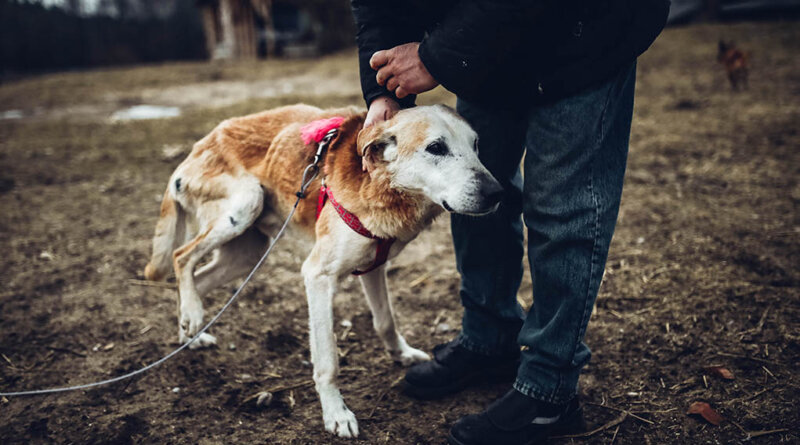What To Do If You Can’t Afford Your Dog’s Cancer Treatment
Just like with humans, treatment for cancer in dogs will not be cheap. When this unfortunate event happens, you’ll need to know what to do if you can’t afford your dog’s cancer treatment.
Unfortunately, one of four dogs will be diagnosed with cancer in their lifetime. The leading cause of death for dogs under the age of 10 is cancer.
The majority of pet owners all over the world are dog owners. For most of us, our dog is not just a pet, but they are simply a part of the family and we can’t bear the thought of losing one of them.
Below, we’ll discuss your options for treatment and how to make the best decision for you and your dog. But the first thing you need to do is don’t despair.
There are plenty of funds around the U.S. that can help pet owners access affordable pet care. Some even offer free treatment.
What To Do If You Can’t Afford Your Dog’s Cancer Treatment
Preventative Measures
We can never know when will cancer occur to us or our dogs. And even though you’ve taken a lot of precautions, they still can develop this disease.
So what are the preventative measures that you can do to help your pup? Firstly, remember that food and water is your best friend.
As the dog owner, you have to ensure that their food does not have wheat, gluten, soy, or corn.
On the other hand, you’ll need to make sure that the water that they are drinking is free from fluoride, chlorine, agricultural chemicals, or heavy metals.
It also won’t hurt anyone if you learn about a few signs or symptoms of cancer in dogs. Monitor your pets as you’ll be the one to know if your dog is not acting their natural self.
If you happen to see that they are a bit lethargic and experiencing weight loss, it’s best advised to bring them to your most trusted vet.
When it comes to dog cancer, the main key to a successful treatment is catching the disease in its early stages.
But when that time comes, always remember that the first step in solving any problem is recognizing there is one. Once you’ve gathered yourself from this terrible news, it’s time to take action.
Discuss The Disease and Treatment With Your Vet
Another thing that you should do is discuss and learn about everything you need to know about your dog’s cancer.
There are plenty of types of cancer in dogs. Later in this article, we’ll also discuss five of the most common cancer in dogs.
Moreover, you can ask your vet anything about your dog’s diagnosis. Cancer doesn’t mean that it’s the end for your dog.
Some cancer is only in one area and it can be easily treated. However, some cancer requires more extensive treatment.
Here, you can also ask your vet about the treatment that is needed for your pup. The total expense of their treatment can vary on the type of cancer your dog has and their prognosis.
Furthermore, you can also discuss with your vet or other dog experts your dog’s quality of life. For instance, you need to weigh the money you’ll spend to keep your dog alive while ensuring its quality of life.
Talking to your vet or an expert can help you understand how far your dog can go with treatment. Because treating cancer in dogs can be painful for them and for the owners.
This all depends on you, the dog owner. Some dog owners choose to let their dogs die peacefully and with minimal pail rather than see them suffer in pain for much longer.
However, some dog owners prefer to fight through it all. It all comes down to your decision and remember that you should consider your dog’s quality of life when it comes to treatment.
Ask About Installment Payment Plans
Fortunately, you can also ask your vet if they are offering installment payment plans if you can’t afford your dog’s cancer treatment. Some vets or animal hospitals can agree to pay back the fee in installments.
For instance, you can work things out with your vet where you’ll be paying $100 or $200 a month every month for the next year (depending on the bill) to pay off your dog’s treatment.
A lot of vets are compassionate and are willing to help you out if they know that the treatment they’ll about to do will work.
It’s not a bad idea to suggest a payment plan so that your pup can receive the immediate treatment it deserves.
Pet Insurance
Nowadays, we can also get insurance for our pets. Luckily for some, other pet insurance companies will gladly cover diseases like cancer.
If you have pet insurance, speak with them to know how much are they willing to cover if this unfortunate occurrence arrives. When it comes to pet insurance, there are different kinds of plans.
First is the Accidents-Only Plan. This is the most basic type of dog health insurance and also the cheapest one. As the name suggests, this insurance covers only accidents.
Secondly, the Time-Limited Plan. This pet insurance does not only cover accidents, but also a wide range of diseases.
This plan is also affordable since as the name suggests, there’s a time limit to this insurance. Usually, the time limit is 12 months.
Thirdly, the Maximum Benefit Plan. This type of pet insurance plan is similar to the Time-Limited plan but the main difference is that it has no time limit.
However, this type of plan is not cheap. It can cost you over $100 per month. But it can also end up saving you a lot of money in the long run.
Lastly, the Lifelong Pet Health Insurance Plan. This plan is the most expensive, but it offers you a lot more security and flexibility compared to the three plans above.
Start a Fundraiser
The last option that we can recommend is starting your fundraiser. There are now plenty of sites like GoFundMe or even Facebook where you can spread awareness and raise some funds for your pup.
Think outside of the box. You can start fundraisers by creating an event. For instance, start any of these:
- FunRun
- Charity Auctions
- Custom t-shirts shop
- Artshow
- Car wash
When it comes to setting up these kinds of fundraisers, it’s important to let the people know that all of the money will go towards the treatment of your dog.
Dog Cancer Treatment Options and Their Costs
Now that we’ve discussed what to do if you can’t afford your dog’s cancer treatment, let’s talk about cancer treatments and how much they usually cost.
Surgical Removal
One of the most common types of cancer treatment is surgery. Surgical removal is physically removing as much cancer as possible.
It is best performed by a surgeon with experience in surgical oncology. These surgeons are often board certified by the American College of Veterinary Surgeons.
They have plenty of training and knowledge when it comes to tumor biology and the role of surgery in treating cancer.
One-time surgery can cost $500 or higher depending on the location of the tumor.
Chemotherapy
Chemotherapy is usually the treatment for dogs that has lymphoma and other malignancies. It is recommended if cancer has already spread to other areas of the body or is known to have a high chance of spreading.
Most dogs do not suffer from chemotherapy side effects because vets don’t use the same high doses of medicine. However, they may not experience fur loss, but some breeds can experience hair thinning.
Another possible side effect is that your dog will have a smaller appetite and experience some diarrhea or vomiting 24-72 hours after a chemotherapy session.
Chemotherapy can range from about $200 to $5,000.
Radiation Therapy
Another option is to put your dog through radiation therapy if the tumor is not in a good spot for surgical removal. It can also help wipe out any remaining tumor cells after surgery.
Radiation therapy is also recommended if the surgical removal is incomplete, meaning that there are still cancerous cells left behind.
Unfortunately, radiation therapy is probably the most expensive treatment out of the three choices. It ranges from about $2,000 to $6,000 or more.
Other treatments include:
- Immunotherapy
- Cryotherapy
- Palliative Therapy
3 Most Common Cancer in Dogs and Their Possible Treatments
Lymphoma
Lymphoma occurs when a tumor develops in lymphocytes. Since lymphocytes are found throughout the body, there are different types of lymphoma:
- Multicentric Lymphoma (tumor is found in the lymph nodes)
- Alimentary Lymphoma (tumor is found in the intestine)
- Mediastinal Lymphoma (tumor is found in the either-or thymus and mediastinal lymph nodes)
- Extranodal Lymphoma ((tumor is found in specific organ eyes, central nervous system, kidney, lungs, or skin)
Treatment
There are a few treatment options for Lymphoma in dogs. For instance, your vet can do:
- Chemotherapy
- Radiation Therapy
- Surgery
- Prednisone
Mast Cell Tumor
Mast Cell Tumor is also known as Mastocytoma or mast cell sarcoma. Mastocytoma occurs when there is a collection of mast cells in an area. The mast cells divide rapidly and grow into a tumor.
Some mastocytoma may grow gradually and others often grow rapidly. Often, mastocytomas are benign but they can be malignant.
Mastocytoma release significant amounts of histamines, heparin, serotonin, and cytokinesis which may affect the function of the surrounding cells.
Treatment
Once your dog gets diagnosed with mastocytoma, it is usually surgically extracted and then sent to a pathologist for examination to find out the grade of the tumor.
If the tumor is low-grade, it is a less aggressive cancer. However, if it’s a high-grade tumor, it is more likely to spread quickly meaning a more aggressive cancer.
A few treatment options for mast cell tumors are:
- Surgical Removal
- Chemotherapy
- Radiation Therapy
- Medication (Immunosuppressive steroid administration/anti-histamines)
Melanoma
Melanoma occurs when a tumor develops in melanocytes. This disease is a malignant tumor that affects the pigmented cells in the skin.
These skin cells often metastasize and do not function at all or properly, thus obstructing the normal function of the organ.
Melanoma often occurs around the mouth commonly but it can also develop in lymph nodes or the lungs.
Treatment
Generally, the treatment for melanoma is surgery. Typically benign, the mass that develops in the haired skin is required to be surgically removed.
However, in some cases, they can recommend doing chemotherapy every 3 weeks. Also, radiation therapy can help prevent the possible regrowth of a tumor once it is removed.
Frequently Asked Questions When You Can’t Afford Treatment for Dog Cancer
How Long Can dogs live with cancer without treatment?
No technology can determine how long your pet can live when it comes to cancer. However, the type of cancer and how far it has advanced at diagnosis can help you get an idea.
For instance, if left untreated, Lymphoma’s average survival time from diagnosis is about two months.
Can CBD oil for dogs help with cancer?
Yes, even though CBD Oil is not generally a cure for cancer, it can still help. How? Well, cancer can cause pain, inflammation, weak appetite, and exhaustion.
CBD can stimulate the dog’s Endocannabinoid System and help regulate the dog’s appetite, pain responses, and many more.
How do you know if a dog is in pain from cancer?
It’s important to keep an eye out on your dog especially when it comes to cancer since it is best treated early. Some signs of pain in dogs with cancer are:
- Limping
- Loss of Appetite
- Heavy Panting
- Shaking
- Aggression
- Excessive grooming
- Increased Vocalization
What To Do If You Can’t Afford Your Dog’s Cancer Treatment: Summary
There are plenty of ways you can help your dog if they are struggling with cancer. You should know by now what to do if you can’t afford your dog’s cancer treatment.
You should never lose hope. You must learn everything you need to when it comes to the type of cancer diagnosed to your pup.
A few ideas where you can afford your dog’s treatment is starting a fundraiser. Start by something small like setting up a GoFundMe account.
If that doesn’t work out, you can always ask your neighbors for help through auctions, fun runs, art shows, or selling customized t-shirts.
If you have pet insurance, now’s the time to call them and ask how much can they shoulder the treatments.
Also, you can ask your vet if you can pay for your dog’s treatment through installment. A lot of vets are compassionate and they are eager to serve animals.
As dog owners, we all want what’s best for our pups. We’ll do anything for them since they are not just pets but have been a great addition to the family.
And I’m pretty sure they’d do the same for us.
RELATED: SARCOMA IN DOGS: A SCIENCE-BASED GUIDE
Related










